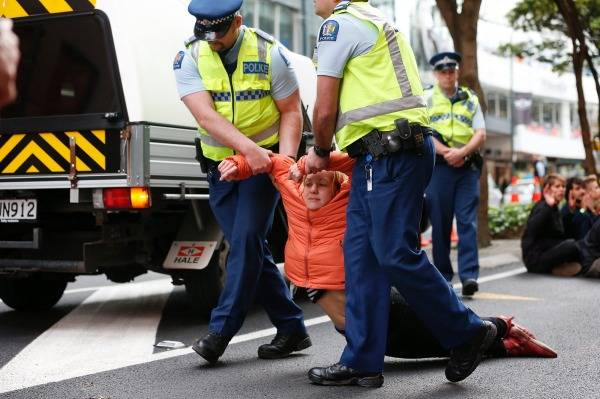
The government of New Zealand has taken a hardline approach that is clearly an intimidation tactic against those who oppose the TPP by calling them radicals and a threat to national security, while ordering police to visit anti-TPP activists at their homes to interrogate them regarding protests later this week, the New Zealand Herald reported Thursday.
“Police are checking in on ‘known activists’ around the country ahead of TPP protests later this week,” the daily said.
Scout Barbour-Evans, an anti-TPP activist from Dunedin, New Zealand, told the newspaper that police knocked on their door at 10 a.m. Thursday.
As the New Zealand Herald explained, Barbour-Evans is transgender and goes by the gender-neutral pronoun “they.”
They said the police were inquiring into what plans protesters had in regards to their anti-Trans-Pacific Partnership action in Dunedin.
Scout said what the government is doing today regarding anti-TPP activists is comparable to incidents that took place in the country in 1981, when the New Zealand national rugby team was headed to South Africa to play against a local team. But activists in New Zealand protested, saying the game was like condoning apartheid. About 1,500 people were arrested after 200 protests across the country.
The activist also criticized the presence of armed police at Prime Minister John Key’s State of the Nation address on Wednesday.
Although saying monitoring those who oppose the highly controversial trade agreement was “entirely predictable,” the police measure shows the «disrespect the government has had throughout to people’s right to voice their dissent about this negotiation and this agreement,” said prominent anti-TPP protester Professor Jane Kelsey.
She said the government has carried out many attempts to shut down democratic participation within the country, and more notably against all opposition to the TPP.
«One of the problems they’ve had is that the opposition has been a groundswell throughout the country of ordinary people from ordinary communities. If you look at the people who’ve been engaged in the marches it’s been grandmas and grandpas and people with pushchairs,» the activist added, saying, «That’s an image the prime minister I’m sure is quite desperate to dislodge.”
Kelsey highlighted the fact the government is making a law and order issue out of the opposition to the agreement, by going as far as calling anti-TPP activists radicals who pose a threat to national security.
»We’ve been seeing them progressively rolling out this strategy, or this attempt to redefine and create a law and order issue out of it,” she said.
Civil liberties lawyer Michael Bott said the police measure could have a «chilling» effect on freedom of expression and the right to protest.
«These people haven’t committed any crime and yet the police are going to conduct a search or an interview, and there are legal concerns with that,» Bott said.
The measure exposes the concerns the government has surrounding protests, and the fact that they know it is highly unpopular in the country.
The public polls are also very revealing, as the most recent one published by Itsourfuture.org.nx shows that 61 percent oppose the agreement, while 30 percent expressed no opinion. Only 9 percent approved of it, although they did express some reservations.
This content was originally published by teleSUR

